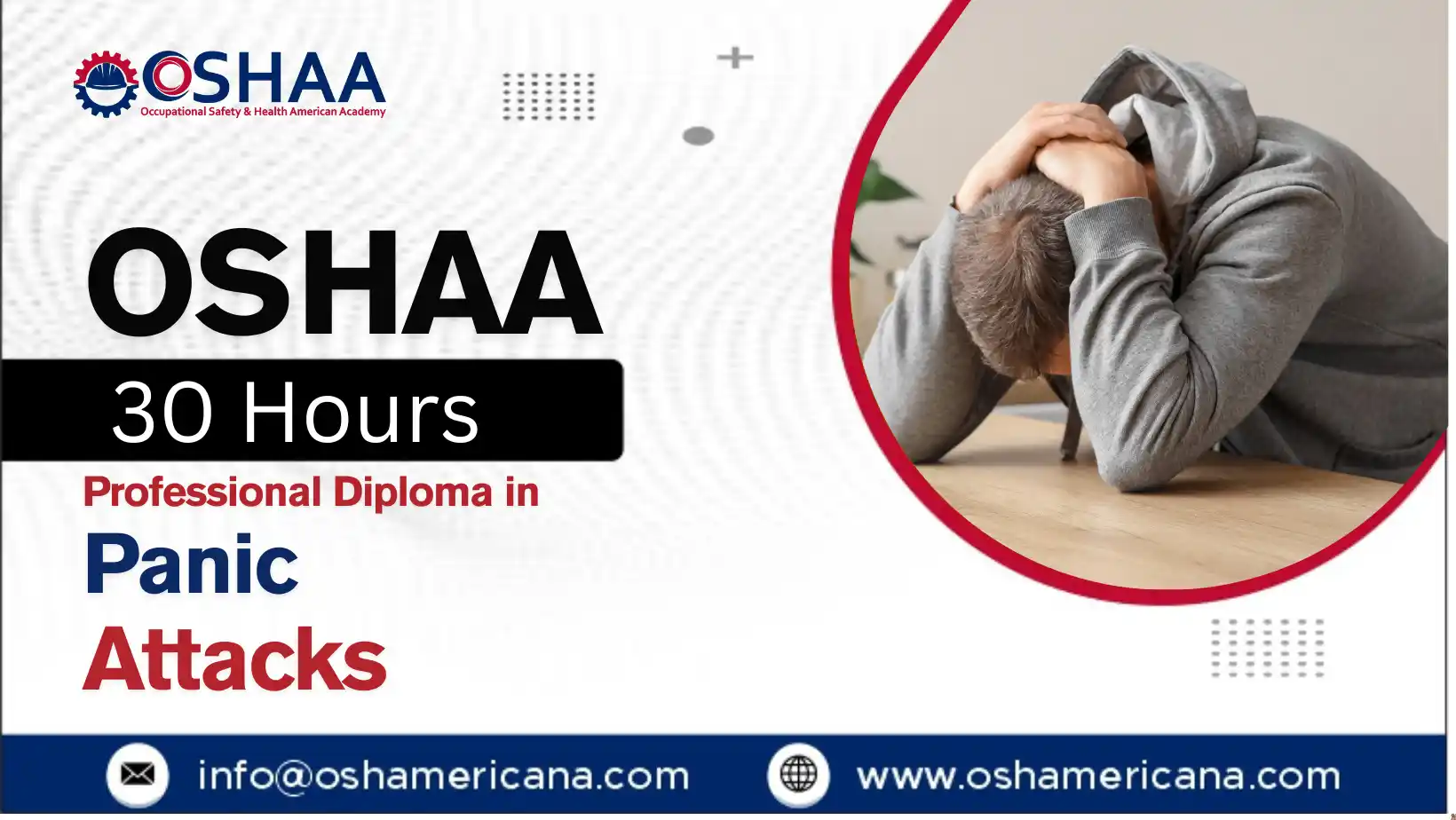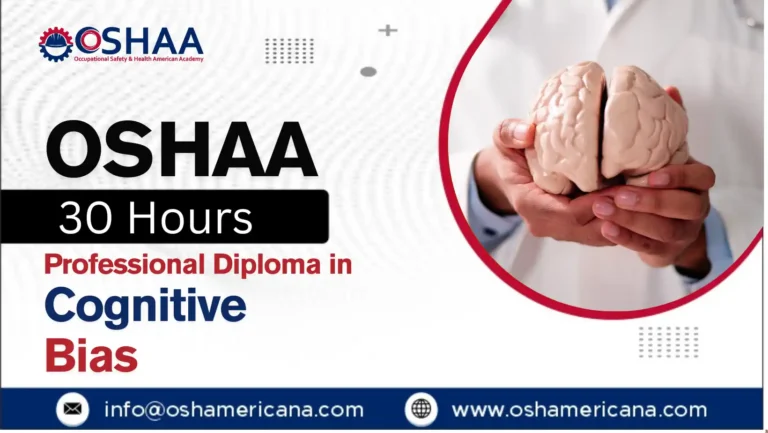The OSHAA 30-Hours Professional Diploma in Panic Attacks is a comprehensive and professionally recognised qualification designed for individuals who wish to deepen their understanding of panic-related disorders. This diploma equips participants with essential knowledge, practical techniques, and evidence-based strategies to effectively support individuals experiencing panic attacks, while promoting a calm and compassionate approach to mental health care.
The OSHAA diploma offers a structured 30-hour curriculum covering the psychological, physiological, and behavioural aspects of panic attacks. Participants explore the nature of panic, how it manifests in the body, and the complex factors that contribute to panic disorders. The course also introduces practical tools for early identification, de-escalation, and long-term management of symptoms.
This diploma is suitable for participants working in mental health, education, social care, human resources, or any environment where they may encounter individuals experiencing panic attacks. It is also ideal for those looking to enhance their personal understanding of anxiety disorders, or for professionals aiming to integrate mental health support into their existing roles.
The OSHAA 30-Hours Professional Diploma in Panic Attacks provides participants with the tools and understanding needed to recognise, respond to, and support individuals affected by panic. With a focus on compassion, professionalism, and practical care, this qualification is an essential resource for anyone committed to promoting mental health and emotional resilience in today’s fast-paced world.
OSHAA 30-Hours Professional Diploma in Panic Attacks
Study Units
Learning Outcomes
Introduction to Panic Attacks and Anxiety Disorders (3 hours)
- Understand the definitions and classifications of panic attacks and anxiety disorders
- Distinguish between general anxiety and panic-related conditions
- Recognise the prevalence and social impact of panic disorders
- Gain insight into the diagnostic criteria and progression of symptoms
Biological and Psychological Mechanisms of Panic (5 hours)
- Understand the role of the autonomic nervous system in panic responses
- Explore the influence of brain chemistry and hormonal responses on panic
- Examine psychological models explaining panic, including fear conditioning
- Recognise the interplay between thoughts, emotions, and physical symptoms
Identifying Triggers, Patterns, and Risk Factors (4 hours)
- Identify common internal and external triggers for panic attacks
- Analyse behavioural patterns and cycles that sustain panic disorders
- Understand genetic, environmental, and lifestyle-related risk factors
- Apply techniques for early recognition and personal trigger mapping
Acute Panic Episode: Signs, Symptoms, and Immediate Response (4 hours)
- Recognise the key physiological and behavioural symptoms of a panic attack
- Learn how to respond effectively during a panic episode
- Apply de-escalation techniques to provide reassurance and stability
- Ensure safety while maintaining clear communication and support
Long-Term Management Strategies and Recovery Planning (3 hours)
- Explore holistic and lifestyle-based approaches to long-term recovery
- Understand the importance of routine, structure, and healthy habits
- Develop personalised support plans for ongoing anxiety management
- Learn to measure progress and adjust strategies over time
Cognitive Behavioural Approaches to Panic Disorder (4 hours)
- Understand core principles of cognitive behavioural therapy (CBT)
- Apply thought-challenging and reframing techniques to manage panic
- Use behavioural experiments to reduce avoidance behaviours
- Support the development of healthier thought patterns and coping skills
Breathing Techniques and Grounding Methods for Symptom Control (3 hours)
- Practise evidence-based breathing exercises for calming the nervous system
- Learn grounding techniques to reduce dissociation and regain focus
- Apply these methods in both clinical and everyday environments
- Teach clients how to integrate these tools into their daily routines
The Impact of Panic Attacks on Daily Life and Functioning (4 hours)
- Recognise how panic attacks affect relationships, work, and social life
- Understand the emotional consequences such as shame, fear, and isolation
- Support clients in regaining confidence and independence
- Identify resources for ongoing support and integration into daily life
Course Benefits: OSHAA 30-Hours Professional Diploma in Panic Attacks
- Comprehensive Understanding: Gain in-depth knowledge of panic attacks, including symptoms, causes, and psychological impacts, enabling you to identify and understand this condition effectively.
- Professional Expertise: Acquire specialized skills to assess, manage, and support individuals experiencing panic attacks in various settings, such as clinical, educational, or workplace environments.
- Practical Intervention Techniques: Learn evidence-based strategies and practical interventions to help reduce panic attack episodes and improve patients’ overall well-being.
- Enhanced Communication Skills: Develop the ability to communicate empathetically and effectively with individuals suffering from panic attacks, fostering trust and better support outcomes.
- Career Advancement: Boost your professional credentials with a recognized diploma that enhances your qualifications for roles in mental health support, counseling, healthcare, and occupational safety.
- Improved Workplace Safety: Equip yourself with the knowledge to contribute to healthier, safer workplaces by identifying panic-related risks and implementing supportive measures.
- Flexible Learning: Benefit from a well-structured, 30-hour program designed to fit around your schedule, providing both theoretical knowledge and practical application.
- Certification Recognition: Earn a professional diploma from OSHAA, boosting your credibility and opening doors for further education and specialized certifications in mental health and wellness.
- Mental Health Professionals seeking to deepen their understanding and skills in managing panic attacks effectively.
- Counselors and Therapists looking to enhance their toolkit with practical strategies for supporting clients experiencing panic disorders.
- Healthcare Providers including nurses, general practitioners, and allied health staff who want to improve patient care related to panic attacks.
- Occupational Health and Safety Officers aiming to promote mental well-being and create safer workplace environments.
- HR Professionals and Managers responsible for employee wellness and interested in identifying and supporting staff affected by panic attacks.
- Social Workers and Support Staff working with vulnerable populations where panic attacks may be prevalent.
- Students and Learners in psychology, social work, or healthcare fields who want foundational knowledge and professional certification on panic attacks.
- Anyone Interested in mental health awareness who wants to understand panic attacks better and learn how to provide meaningful assistance.







